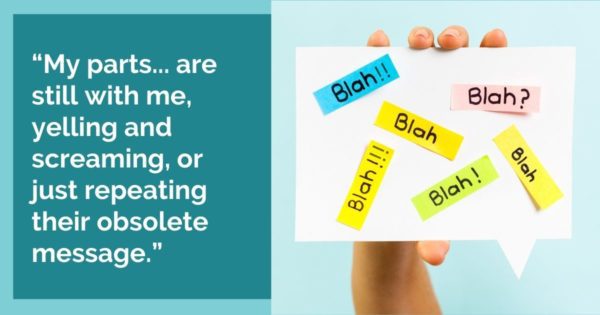"I have constant critical thoughts about other people"
~~~~~~~~~~~~~~~~~~~~~~~~~~~~~~~~~~~~~~~~
Frank writes: "I'm bothered by a very negative inner critic: a 'bundle'
of voices in me that criticize not so much myself but other people.
These voices or thoughts seem quite unchangeable, I'm conscious of them
(perhaps because I do a lot of Zen meditation), and I try to just look
at them in a meditating way and let them go. But within a minute (and
often much faster than that) they are 'back in business' again. In
their opinion there is not a lot that people can do right.
"To
give a few examples: People in the traffic make a lot of stupid
mistakes; they also drive too close behind me, or too slow in front of
me; they drive too stressed and irritated, which stresses and irritates
me. Colleagues also act in an irritating way: they act artificial, or
they play nasty games to get what they want; and they don't listen at
all when you tell something but they always want your attention for
their silly stories. Friends don't listen to me either, they don't
understand me and they don't even make an effort; do they really love
me? no, they just use me for their own profit.
"The list is
really endless. My question is: the Zen way of dealing with these
voices is making me more aware of them, but is there a Focusing way of
coping with them which can make them feel understood and can make it a
little lighter inside?"
Dear Frank,
Parts of you that criticize other people have the same motive as parts
that criticize you: to prevent something bad from happening to you and
to help you get what you need. The problem is that they aren't very
successful at these purposes. Why then do they persist? Because they
are "partial-selves" and they are stuck in a partial view.
What needs to happen so there is a bit more lightness?
Well first, let's be gentle to these "negative" voices. They are trying to do their best.
It's already a huge shift when you say Hello to them. I suspect Zen
would call this "not attaching to your thoughts." We call it
disidentifying from them.
Then say to them, kindly, "I guess you must be worried about something."
Maybe what you'll get back is something like, "Yeah, I'm worried we'll always be held back by these idiots!"
And
you can say back, "Ah, you're not wanting me to be held back." See if
you feel some kind of relief right there, like they're glad you heard
that. And there's more.
We're listening to what they are not wanting
to have happen to you. The first responses may seem obvious or
superficial, but then we can go deeper: "So I'm wondering what you're
not wanting to have happen if we're held back."
At a certain point there will be a felt shift, as this becomes more and more about you, and not so much about the other people.
~~~~~~~~~~~~~~~~~~~~~~~~~~~~~~~~~~~~~~~~~~
When
a person is cranky, irritable, always complaining about other people,
it often turns out that they are really in pain themselves.
The
same is true of these inner parts of us. The constant irritation with
other people takes attention away from a deeper pain, perhaps even a
deep shame or sense of unworthiness.
Your compassionate empathy
with what might be under these cranky, irritable, critical parts of you
can include the possibility that they may be in pain. These parts of
you may be suffering–or they may be protecting other parts of you that
are suffering. In fact, this may be where the force and the persistence
of these criticizing experiences comes from.
So in addition to
what you can do in the moment, while driving for example ("Ah,
something is worried.") it could also be important to set aside some
quiet Focusing time when you can really go as deep with your empathy as
these parts are ready for.







